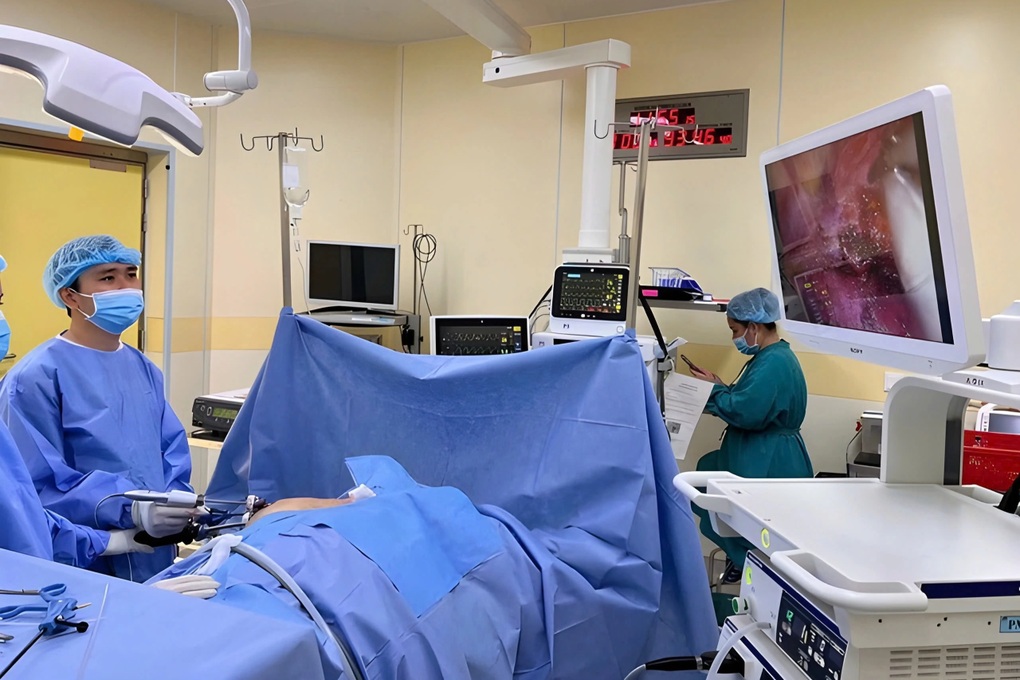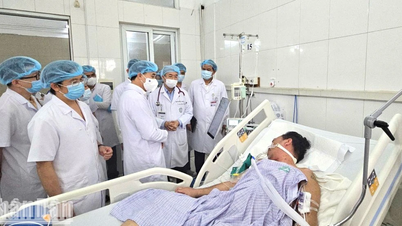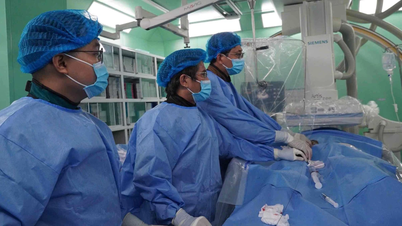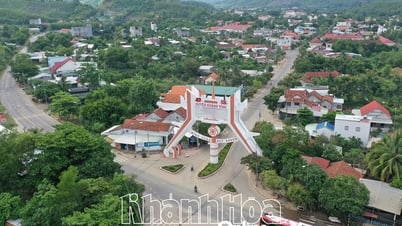That was the case of Mr. P. (69 years old, Cambodian nationality). Before that, he had many days of fatigue, dizziness, and black stools for unknown reasons.
From Cambodia to ask for help from Vietnamese doctors
At a hospital in Cambodia, the man was diagnosed with gastrointestinal bleeding. However, after more than half a month of treatment and nearly 20 units of blood transfusion, the patient's condition did not improve but became increasingly serious.
Faced with an urgent situation, the family traveled hundreds of kilometers to bring the patient from Cambodia to seek help at Nam Saigon International General Hospital (HCMC).
When arriving at Nam Saigon International General Hospital, the man had swollen hands and feet, a soft abdomen, and large amounts of dark red blood in his stool, indicating that the gastrointestinal bleeding was still severe.
Faced with the risk of excessive blood loss, doctors quickly performed paraclinical tests to find the exact cause and location of the bleeding. CT scan results showed that the patient had a tumor in the small intestine - a location that is difficult to detect without accurate diagnostic techniques.
Master, Specialist Doctor II Nguyen Trung Duong, Deputy Head of General Surgery Department, Nam Sai Gon International General Hospital, assessed that the possible cause of the man's prolonged gastrointestinal bleeding was due to the above tumor.
Tumors in the small intestine often progress silently, without obvious symptoms, so they are difficult to detect in the early stages.
Advanced technique saves patient from rare tumor
Based on the diagnostic results, Dr. Nguyen Trung Duong decided to perform endoscopic surgery to treat the tumor located in the man's small intestine.
This is an advanced surgical method, less invasive than traditional open surgery. With this technique, doctors removed the segment of intestine containing the bleeding tumor, while controlling the bleeding and preventing dangerous complications.

Doctors at South Saigon International General Hospital performed endoscopic surgery to save a Cambodian man (Photo: Hospital).
Doctor Duong, Deputy Head of the Department of General Surgery, said that this was a rather complicated surgery, requiring experience and skill from the surgeon because the location of the tumor was very difficult to access, deep inside the small intestine.
Whether the tumor is benign or malignant, if not detected and treated promptly, the patient may face serious complications such as prolonged anemia, physical exhaustion, intestinal obstruction or even progression to cancer.
After the surgery, Mr. P. recovered well and was discharged from the hospital after only 5 days, without needing any additional blood transfusions.
Doctors warn that black stools are a sign of gastrointestinal bleeding, which usually indicates the presence of blood in the digestive tract. This is a serious warning of underlying conditions such as stomach ulcers, esophageal varices or small intestine tumors.
"Mr. P's case is an important reminder not to be subjective when there are unusual signs such as black stools or prolonged fatigue of unknown cause.
Early examination combined with modern diagnostic techniques will help promptly detect underlying diseases and increase the chance of effective treatment," Dr. Duong recommended.
Source: https://dantri.com.vn/suc-khoe/nguoi-dan-ong-nguy-kich-vi-sat-thu-an-minh-sau-trieu-chung-tieu-phan-den-20250512125214313.htm




![[Photo] Prime Minister Pham Minh Chinh starts construction of vital highway through Thai Binh and Nam Dinh](https://vphoto.vietnam.vn/thumb/1200x675/vietnam/resource/IMAGE/2025/5/12/52d98584ccea4c8dbf7c7f7484433af5)
![[Photo] Prime Minister Pham Minh Chinh works with the Standing Committee of Thai Binh Provincial Party Committee](https://vphoto.vietnam.vn/thumb/1200x675/vietnam/resource/IMAGE/2025/5/12/f514ab990c544e05a446f77bba59c7d1)

![[Photo] Prime Minister Pham Minh Chinh receives Swedish Minister of International Development Cooperation and Foreign Trade](https://vphoto.vietnam.vn/thumb/1200x675/vietnam/resource/IMAGE/2025/5/12/ae50d0bb57584fd1bbe1cd77d9ad6d97)




















































































Comment (0)